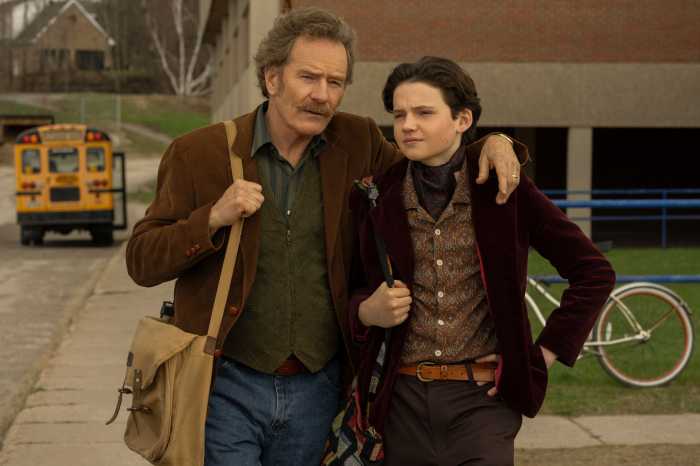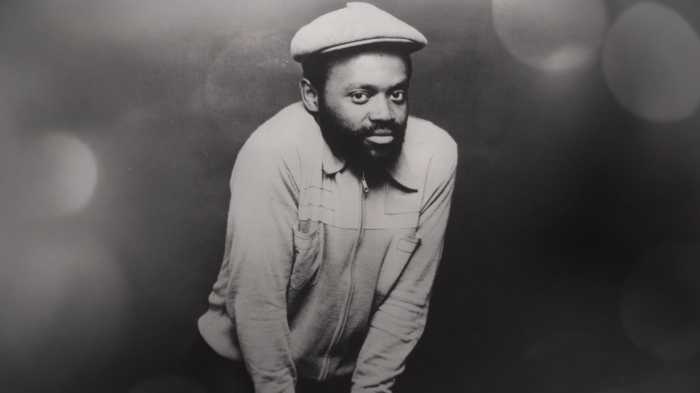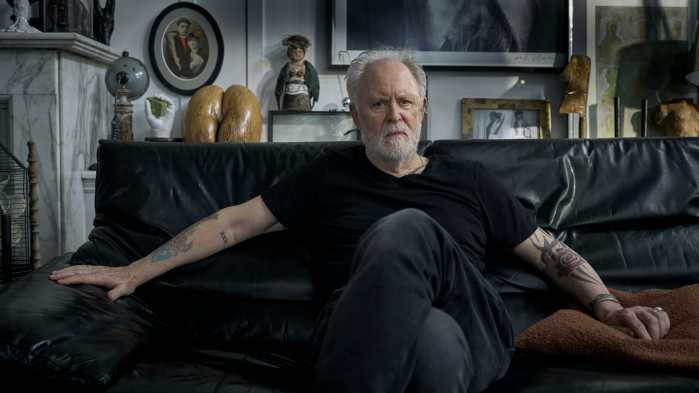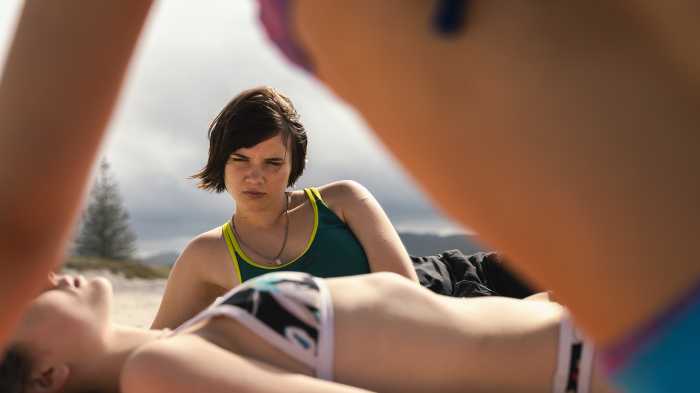This year’s Tribeca Film Festival offers more than two dozen queer features, documentaries, and shorts. Here is a rundown of a handful of features and shorts from this year’s program.
The festival offers moviegoers the opportunity to see the sweet and sour comedy-drama, “Everything’s Going to be Great,” prior to its theatrical release on June 20. Les(ter) Smart (Benjamin Evan Ainsworth) is a 14-year-old theater kid in 1989 Akron, OH, who dreams of being on Broadway. To help achieve his goal, he often goes on stage in scenes that he is not in during the regional theater production put on by his parents, Buddy (Bryan Cranston) and Macy (Allison Janney) — much to their chagrin.

When the Smarts move to New Jersey, Les feels he has a chance to fit in. He even develops a crush on a local actor (Simon Rex). But a situation unexpectedly forces the family — which includes Les’ older brother, Derrick (Jack Champion) — to move to Kansas, where Macy’s brother, Walter (Chris Cooper) lives. Les, of course, feels more adrift than ever. Director Jon S. Baird, working from a script by Steven Rogers, has Les coping with his reality by imagining conversations with his theater heroes, including Noel Coward, Ruth Gordon, Tallulah Bankhead, and William Inge. The insights he gets from them and his parents help Les survive and continue to dream even when his life is a nightmare. Featuring solid performances by the entire ensemble cast, “Everything’s Going to be Great” is about learning how to be special, rather than tragic. This film will resonate with anyone who was a theater kid in middle school.
“The Inquisitor” is Angela Lynn Tucker’s loving documentary portrait of Barbara Jordan, who was the first Black woman (and lesbian, though she was professionally closeted) to be elected to the Texas State Senate and then US Congress as well as provide a keynote address at the Democratic National Convention. She was on the House Judiciary Committee that voted to impeach Nixon, and she was instrumental in passing the extension to the 1965 Voting Rights Act that prohibited racial discrimination in voting. The film traces Jordan’s life and accomplishments from her childhood in Houston’s 5th ward and her education — learning how to debate in high school to networking in law school. Her oratory and collaborating skills served her well, and “The Inquisitor” features many of Jordan’s outstanding speeches that spoke truth to power and explained the constitution. The film briefly touches on her long-term relationship with Nancy Earl, and why she was reluctant to fight for LGBTQ rights — being out would have lost her credibility. (Jordan was also criticized for not being more outspoken for Black and women’s rights.) Tucker’s film eloquently emphasizes how Jordan was a disruptive force who demanded respect. Watching her toy with Republican senator Gordon Humphrey over Robert Bork’s nomination for the Supreme Court is delicious. A stirring hagiography, “The Inquisitor” makes one wish Jordan was still around today.
Barbara Jordan walked so Sarah McBride could run. “State of Firsts,” directed by trans filmmaker Chase Joynt, showcases Sarah McBride, the first out trans member of Congress. This admirable documentary shows that McBride is nobly focused more on representing her constituents in Delaware — and being seen as a “whole human” — rather than engaging with Republicans who foment hate, bigotry, and discrimination. The first half of the documentary features McBride on the campaign trail and she balances her hopes with pragmatism. She strategizes how to respond to Marjorie Taylor Greene’s attacks, which extend — after McBride is elected — to anti-trans bathroom bills. How McBride defends her position to comply with the bill shows her grace under pressure. Still, there is a backlash that hurts. “State of Firsts” illuminates how McBride must always smile to reflect pride not despair, and not rise to the MAGA bait, such as being misgendered in her new job. (Yes, the film features a clip of Keith Self disrespecting her.) Joynt’s film also captures several highlights, from an unexpectedly sweet encounter McBride has in a convenience store to her election night landslide, and a call from President Biden. “State of Firsts” is an inspiring chronicle of the start of McBride’s political career, which will hopefully continue for decades to come.
“The Last Guest of the Holloway Motel” is a candid and wistful portrait of Tony Powell. In the 1970s, he was a successful football (soccer) star for Norwich in the UK. But in 1984, he moved to West Hollywood, where he fell in love with a man named David, and eventually took a job managing the Holloway Motel. Directors Ramiel Petros and Nicholas Freeman capture Tony at a critical time in his life. The motel is being closed, and he starts reconnecting with family members he has not had contact with for nearly 40 years. In revealing interviews, Tony addresses his fear of being gay — both in football and with his family — as well as the freedom he found for himself in America. “The Last Guest of the Holloway Motel” respectfully bears witness to Powell’s complicated emotions as this engaging, aging man reconciles the various facets of his life.
“Ride or Die” opens with Paula (Briana Middleton) reconnecting with her former classmate (and crush), Sloane (Stella Everett). There is a nice intimacy developing between them when they impulsively decide to drive from St. Louis to California together. However, once on the road, they encounter nothing but trouble — first when Paula gets a flat, and later during an encounter that turns violent. “Ride or Die” tests Paula’s patience — and viewers’ — as Sloane creates as many problems as she solves. Middleton delivers a strong, subtle, and sympathetic performance as Paula. She is attuned to the racism and various microaggressions she experiences on the cross-country journey. In contrast, Everett, plays her part too broadly, making her less likable as the film wears on. Director and cowriter Josalynn Smith shows promise with her low-budget romantic thriller, and she includes a fun cameo by Guinevere Turner.
The Spanish feature, “All We Cannot See” has Mikela (Bruna Cusí) trying to help — or at least befriend — the moody Aora (María Valverde), whom she first encounters in a bathroom with blood on her sneakers. Grappling with trauma, Aora impulsively decides to accept Mikela’s offer to drive to Portugal. The two women bond as the drive and share rooms at various hotels and hostels, where Mikela discloses that her twin died as a pre-teen. Aora is less forthcoming; she doesn’t want to talk about an injury she has. After drinking, dancing, and even some arm wrestling one night, the women kiss and couple up. Their relationship, however, may be derailed when Mikela realizes Aora has lied to her about her work, and may be exhibiting signs of mental illness. An episode of homophobia involving some local youths is concerning as is some of Aora’s erratic behavior. “All We Cannot See” benefits from the chemistry between the leads, and the nice reveals that occur as the couple determine if they have a future together.
“Leads” is an agreeable comedy about Mags (Heather Kafka) a once-promising actress who now teaches acting at a university. When her ne’er-do-well brother, Merritt (Justin Arnold), shows up and starts attending her class, he charms her students. But his disruptive nature annoys Mags, who is busy processing an inappropriate encounter with a female student. Adding to her issues is a presentation by Taylor Betts (Macon Blair), a director she worked with before he embarked on a successful career without her. “Leads” generates its gentle humor and drama from the combative relationship between Mags and Merritt, each of whom hurts the other in their efforts to save them. Kafka and Arnold have a terrific rapport that makes this slight film appealing, but the queer content is minimal.
“I Was Born This Way” is a celebratory documentary that walks viewers through the highs and lows of gay singer, activist, and archbishop Carl Bean’s life. He recounts his difficult childhood in Baltimore and musical success — first as a gospel singer, and then for Motown, when Berry Gordy asks him to record a new version of “I Was Born This Way,” in 1977.

The song became a gay anthem, but Bean took his passion and energy — and his big voice — back to the church, founding the Unity Fellowship Church, a space for queer people of color. He also became an AIDS activist. Directors Daniel Junge and Sam Pollard nimbly trace Bean’s life and work using animation, archival footage, and interviews with Billy Porter, who produced the film and records a new version of Bean’s B-side “Liberation,” as well as Lady Gaga, whose monster hit “Born This Way” was inspired by Bean. “I Was Born This Way” is a fitting tribute to an underknown legend.
Among the festival’s queer shorts, these films stood out:
The amusing short, “Poreless,” screening in the “Family Matters” program, has Akram (Akbar Hamid) hoping to sell his beauty product, Poreless — “instant airbrush in a jar” — in a Beauty by Beauté competition. But a complication forces Akram to ask his siblings Arif (Parvesh Cheena) and Asma (Sureni Weerasekera) to present for him until Akram realizes he can’t sell a product about being yourself if he is not himself. “Poreless” is a high energy and droll comedy that makes some pointed comments about diversity as it emphasizes how truth is beauty.
“Kisses and Bullets,” screening in the “Hopes and Dreams” program, is a powerful short that tells the parallel stories of Anahita (Shadi G), an Iranian lesbian in New York and Yalda (Bahar Beihaghi), a straight woman in Tehran. Both young women are anxious — either excited or afraid — to attend the “Woman, Life, Freedom” protests. Anahita’s mother expresses her concern over the phone, but her girlfriend, Shabnam (Arezu Riaz), encourages her. Meanwhile, Yalda heads out to meet her boyfriend, Mani (Samuel Tehrani) to attend a gathering at night. While the title is a bit of a giveaway, how each couple finds empowerment is why this short resonates.
“Wannabe,” screening in the “Showtime!” program, is a cute, high-energy short from Ecuador about teenage Emilia (Martina Pachecho) who hopes to win two tickets to the Spice Girls concert in Miami. (It’s 1996). She and her gay best friend Mateo (Gabriel Saltos) set out to make a video, but bullies interrupt their plans. But there is still a fabulous dance sequence. “Wannabe” is all about dreaming about your best life especially as Mateo stops to fantasize about his crush, a guitarist who plays in Emilia’s brother band. While it wears its heart on its frilly sleeve, “Wannabe” does deliver a decent payoff.
The Tribeca Film Festival | June 4-15 at various venues. | tribecafilm.com/festival

![STATEOFFIRSTS_[MELISSALANGER]_9](https://gaycitynews.com/wp-content/uploads/2025/06/STATEOFFIRSTS_MELISSALANGER_9.jpg?quality=51&w=1200)

































